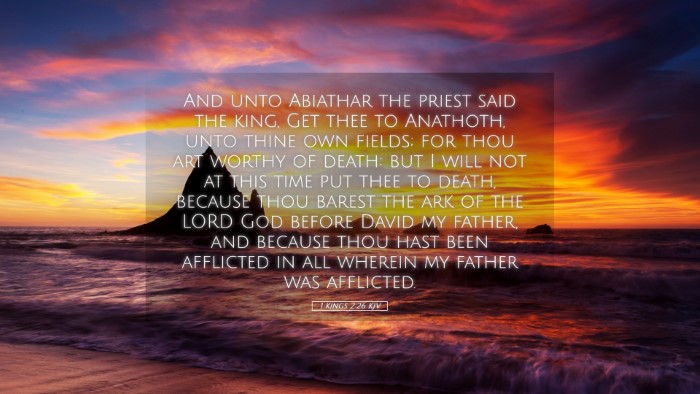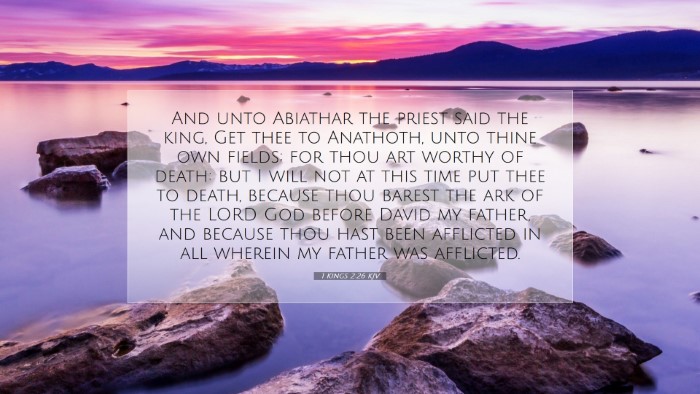Commentary on 1 Kings 2:26
Verse: “And unto Abiathar the priest said the king, Get thee to Anathoth, unto thine own fields; for thou art worthy of death; but I will not at this time put thee to death, because thou barest the ark of the Lord God before David my father, and because thou hast been afflicted in all wherein my father was afflicted.”
Contextual Overview
This verse occurs in a transitional moment in the history of Israel, depicting the consolidation of Solomon's reign following David's death. It captures a profound moment in the establishment of royal authority, where Solomon must navigate loyalty, justice, and mercy. Abiathar, a former priest of high standing, now finds himself on the wrong side of the newly established order.
Insights from Public Domain Commentaries
Matthew Henry's Commentary
Henry emphasizes the theme of justice met with mercy in Solomon's dealing with Abiathar. He notes that even though the priest had supported Adonijah in his bid for the throne, his past service and loyalty to David provided enough grounds for Solomon to exercise grace rather than harsh judgment.
- Historical Significance: Abiathar, as one of the last remnants of the high priesthood linked closely with David, represents the old order of Israelite leadership which Solomon seeks to move beyond.
- The Nature of Royal Authority: Solomon's decision reflects a prudent king's balancing act—acknowledging past loyalties while establishing new authority.
- The Principle of Affliction: Solomon recalls Abiathar’s suffering alongside David, suggesting that shared affliction creates a bond that cannot be easily disregarded.
Albert Barnes' Commentary
Barnes focuses on the idea of retribution and the significance of Abiathar's earlier loyalty to David. He notes that Solomon's decision not to execute Abiathar, despite grounds for it, serves to illustrate the wisdom and temperance required of a ruler.
- Abiathar's Legacy: His expulsion to Anathoth, his native city, symbolized a return to his roots, yet it also serves as a form of punishment without bloodshed.
- Divine Sovereignty: Barnes highlights how Solomon's mercy echoes a larger theological narrative—the providential care of God in guiding the newly established monarchy.
- Symbol of Judgment: Anathoth was associated with the prophet Jeremiah, ironically linking the fate of Abiathar to prophetic destiny.
Adam Clarke's Commentary
Clarke provides a rich historical and theological context, elaborating on the implications of this verse for both Abiathar and the people of Israel. He notes the importance of Abiathar’s priestly lineage and how his removal from office reflects a significant shift in ecclesiastical power.
- Consequences of Political Alliances: Abiathar’s alignment with Adonijah showcases the dangerous nature of political loyalties amidst royal transition.
- Significance of Affliction: Clarke points out how the mention of affliction serves as a poignant reminder of the shared struggles within the covenant community, creating a sense of mutual empathy.
- Theological Reflection: The act of sparing Abiathar can be seen as a reflection of God’s mercy extended to His people, emphasizing that even leaders are subject to grace.
Theological Reflections
1 Kings 2:26 provides pastors, students, and theologians with rich material for contemplation about leadership, justice, and mercy. This verse calls into question how one balances accountability for past actions against the grace afforded by relationship and shared experiences.
Relevance to Modern Leadership
In contemporary contexts, this interaction between Solomon and Abiathar can serve as a case study for leaders who must navigate complex relational dynamics while enforcing justice.
- Handling Dissent: Leaders today may encounter those who have previously aligned themselves against their authority; wisdom lies in discerning how to address such situations justly while extending grace.
- The Role of Historical Relationships: Understanding the history and contributions of individuals can guide leaders in making decisions that honor past service while moving forward.
- Mercy in Judgment: The theological implications of mercy reflect the essence of Christian leadership, as modeled by Christ, who offers redemption even in times of great failure.
Conclusion
The commentary on 1 Kings 2:26 invites us to reflect on our understanding of authority, mercy, and the weight of historical loyalty within the community of faith. It challenges modern leaders to embody the wisdom of Solomon in their own contexts—examining how to uphold justice while extending the mercy that aligns with the heart of God.


